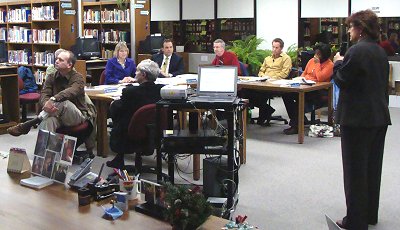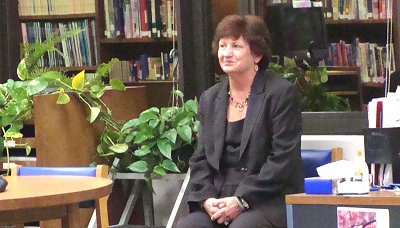- By Dan Veaner
- News
 Print
Print  After years of top administrators part of the fallout has been no long term planning in the Lansing Central School District. While some superintendents initiated long term plans, they weren't at Lansing long enough to enforce them. Superintendent Stephen Grimm took the helm on January 2, 2008, and with signs that he will be staying has initiated a new planning process. To that end Dr. Diane Reed of PLC Associates presented an outline for developing a new strategic plan that will include administrators, teachers, students, and the community in developing a plan over the course of this year.
After years of top administrators part of the fallout has been no long term planning in the Lansing Central School District. While some superintendents initiated long term plans, they weren't at Lansing long enough to enforce them. Superintendent Stephen Grimm took the helm on January 2, 2008, and with signs that he will be staying has initiated a new planning process. To that end Dr. Diane Reed of PLC Associates presented an outline for developing a new strategic plan that will include administrators, teachers, students, and the community in developing a plan over the course of this year."The end product of the whole process will be a plan that gets certified, so to speak, by the board, and thereby, the community," Grimm says. "The goal of the whole process is to create a strategic plan."
Grimm says that it's not practical to develop a 20 year plan like the one the Lansing Fire District uses, in part because of a fast changing environment in State regulations and aid, and in part because it is too hard to predict what children will need that far in the future. But he says a dynamic plan is key to moving the district in the direction the community wants.

Lansing school board considers plan
"A long range plan that's ten to twenty years out for academic achievement is probably not relevant, because those children are not even born yet," he says. "But for programs, for structures, for curriculum development, for processes, embedding these kinds of actions within our culture so we have a collaborative culture of continuous improvement -- it is a true living document."
Grimm says that a plan developed in 2005 was never implemented because of the turnover in the superintendent and business administrator offices.
"There was an operational plan from 2005 that was well put together," he says. "But one of the byproducts of losing superintendents every two years is you lose the momentum toward a strategic planning process. In 2006 you had another one in a different format with different types of systemic structures to support it. Then that went away. It's got admirable goals and authentic needs and priorities that were discussed. The process for keeping it alive was not built in."
The time line calls for a number of task forces to begin working in earnest this April, with a core team of 25 or more people made up of a cross section of shareholder groups, and smaller task forces working on individual elements of the plan.
Grimm says the district will use a 'SMART goals' approach. That is an acronym for a goal that includes all the elements of being Specific, Measurable, Acceptable, Realistic, and Timely. He stresses that building in timely measurability of how well the district reaches its goals is the key to making sure the plan works.
"One of the things we were struggling with as a board in our last meeting -- we looked at our goals from last year, and as we were trying to formulate this year's goals we did not have a good way of identifying how we were going to monitor our success," he says.

Dr. Diane Reed will work with Lansing stakeholders to
guide the planning process
The plan will be comprehensive, including academic goals as well as planning for future expenditures, capital improvement, and so on. Grimm uses the proposed Lansing Commons development that is planned for the area south of Woodsedge as an example of trends that may effect the district. Teams developing the plan will consider how that may increase school populations, change bus routes, etc.
"We can be looking at historically what has been our total budget, what is the tax levy, the tax rate, the total revenues and expenses, what did we have in our reserves, what are our internal and external audit findings, what percent of the findings were corrected, what is our Moody's rating?" he says. "We can look down the road and try to map the historical trends related to some of the macroeconomics of the economy rebounding. What happens when interest rates go back up and how will it affect taxes? How will population effect us?"
He stresses that the plan will be a living document, flexible. It will set a course for the district, but that will not preclude making course corrections along the way.
"The strategic planning process is continuous, and it shouldn't be just annual," Grimm says. "You make a five year plan and you change it every year. You're thinking long, but you're also acting and thinking and planning short."
----
v6i1



